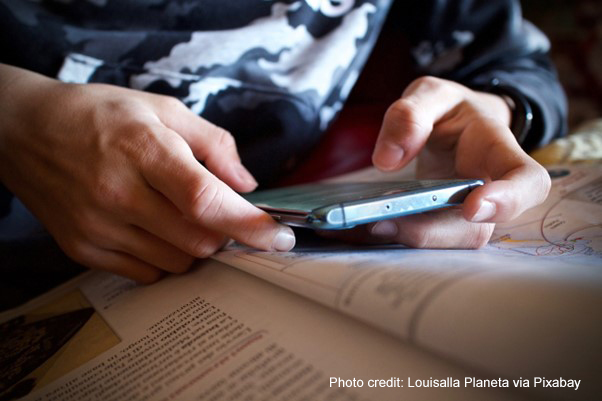Countries across the world (and international agencies that should know better) are calling for the outlawing of smartphones from schools. In this UKFIET Blog, Mike Douse explains how, in the Digital Age, this is the very opposite of what should be happening.
Alleging a ‘negative link’ between excessive use of digital technology and student performance, UNESCO has called for global ban on smartphones in schools in order to “tackle classroom disruption, improve learning and help protect children from cyberbullying”. Their report adds that “digital technology as a whole, including artificial intelligence, should always be subservient to a human-centred vision of education, and never supplant face-to-face interaction with teachers.”
Similarly, the UK government has launched a crackdown on mobile phones in schools across England as part of its “plan to minimise disruption and improve behaviour in classrooms”. “Using mobile phones in schools can lead to online bullying, distraction and classroom disruption which, in turn, can lead to lost learning time” states their Guidance, offering examples of different approaches including “banning phones from the school premises, handing in phones on arrival at school, and keeping phones securely locked away from students”.
Children in China are to be banned from using their phones in school without written parental consent, as the authorities claim that this will “protect young people’s eyesight, improve their concentration and prevent internet addiction”. Finland is also to outlaw mobile phones in school classrooms “in a bid to reverse slumping exam results”, while South Korea’s complete ban on the use of mobile phones in schools is, asserts the National Human Rights Commission of Korea, an “infringement of the basic rights of students including freedom of communication”.
According to the Moscow Times, Russia’s lower-house State Duma Vyacheslav has voted in favour of banning the use of cellphones in school classrooms, a “move they argue will help improve the learning process for students”. This has, however, still to be approved by senators in the upper-chamber Federation Council and then by President Vladimir Putin [who may well have other matters on his mind].
Clearly, educational authorities worldwide perceive smartphones as a threat to the tranquillity of the classroom, the sovereignty of the teacher, and the security of the student. And these decisions are all wrong – diametrically opposed to what should be happening.
Not only because of the easy access to information and utility as a classroom resource that smartphones offer, the ability to access digital learning materials, to make textbooks more accessible, to develop tech skills and acquire the basics of digital citizenship, to obtain quick answers to important questions and to access online encyclopaedias, to carry out calculations, to identify definitions, to obtain organisational skills, to develop responsibility and techno-sceptical thinking (i.e. questioning our relationship with technology), to create memories with friends, or to establish contacts with parents if and when emergencies occur [see, for example, Stat Analytica (2023), for these and further justifications.]
But more because the decision-makers who respond in such anti-cellphone ways still assume that schooling will continue in its present teacher-driven, learner-compliant, second millennium forever-static state. Because they fail to understand that education is undergoing a fundamental transformation, made necessary and possible by EdTech and AI, and symbolised by those very handheld devices that they seek to outlaw. Because current learners and coming generations embody the duality of contemporary consciousness – the tangible and the virtual – necessitating and enabling a fresh approach to learning and teaching. In other words, an exciting and fulfilling and immersive educational experience is emerging.
The ’school’ as we know it is a creature of the industrial revolution. Increasingly, it functions less as a set of buildings wherein students are taught at, and more as a communication network and a guidance process – in a sense also, there is just the one universal school. After the primary or preparatory phase (and onwards throughout life), the learners take over the responsibility for their own learning, extending to its location, to each set of selected learning strategies, and to each personal curriculum.
With a world of information and ideas at their fingertips, learners now call upon teachers for support rather than leadership, for guidance as opposed to discipline, and for encouragement instead of assessment. Preparation for the world of work is no longer the goal, just as selection through examination is replaced by feedback for individual information. Attempting to eliminate cellphones from digital age learning arrangements is, accordingly, as futile and as dysfunctional as, say, the banning of books. Or the outlawing of human imagination.





